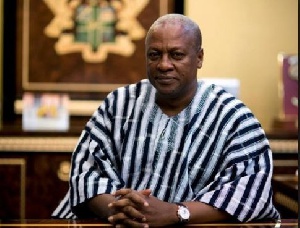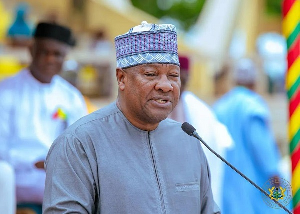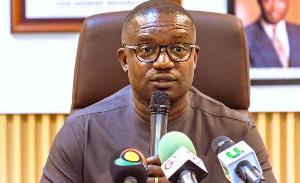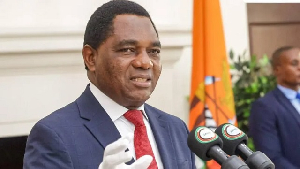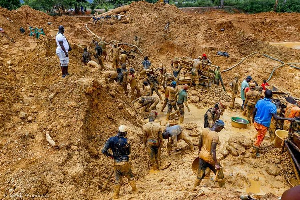If we revisit memory lane, it was Ex-President Mahama who incredibly claimed that they, (NDC government) had rapaciously consumed all the meat on the bone.
Former President Mahama, so to speak, was alluding to Ghana’s unprecedented economic collapse as a result of mismanagement and rampant sleazes and corruption under his watch.
Even though it is somewhat dreary to keep belabouring the point about the sorrowful state of Ghana’s economy under the erstwhile Mahama’s administration, for the sake of balanced annotation, it is important to state the facts anyhow.
It is, indeed, extremely disturbing to keep hearing and reading from the same people who wilfully collapsed the once thriving economy carelessly shouting from the roof top about the current state of Ghana’s economy in barely sixteen months into the NPP government’s forty-eight months mandate.
How could individuals who revoltingly threw Ghana’s economy deeper and deeper into the mire turn around and accuse the NPP government of economic mismanagement in barely sixteen months in office?
In fact, it was the same NDC government that spent excessively and above its means, and in the process needlessly increased our total debt from GH9.5 billion in 2009 to GH122.4 billion as of December 2016. This means that there was virtually no money left in the national purse for the incoming NPP government to seamlessly manage the affairs of the country.
It thus appears that the vociferous minority NDC operatives have no regard for accepted rules and standards. This may explain why the clamorous opposition NDC operatives are bizarrely up in arms about the NPP government’s prudent spending on capital expenditure.
It is, indeed, boundlessly illogical for the minority NDC operatives to expect the NPP government to spend monies they don’t have, notwithstanding the fact that it was the same people who abhorrently emptied the national coffers to the dismay of discerning Ghanaians.
In spite of the massive economic mess left by the erstwhile NDC administration, the current NPP government under the able leadership of President Akufo-Addo has estimably undertook a number of social interventions.
Since assuming power, Akufo-Addo’s government has taken commendable strides to improve the social mobility through implementation of poverty reduction policies such as free SHS, one district one factory, one million dollars per constituency, tax reductions, reasonable utility tariffs reductions, a dam per village in the northern part of Ghana, among others.
Upon taking office, the NPP government has dramatically reversed the inflation rate to a little over 11 per cent from a little over 15 per cent as of December 2016 (GSS 2017).
And despite the huge economic mess created by the outgone NDC government amid stunted economic growth, the Akufo-Addo’s government has efficiently raised the economic growth. Ghana’s economy grew provisionally by 8.5 percent in 2017 compared to 3.7 percent in 2016 (Ghana Statistical Service, 2018).
“The Industry sector recorded the highest growth rate of 16.7 percent, followed by Agriculture 8.4 percent and the Services 4.3 percent.
“Services share of GDP decreased from 56.8 percent in 2016 to 56.2 percent in 2017. The sector's growth rate also decreased from 5.7 percent in 2016 to 4.3 percent in 2017.
“However, two of the subsectors in the services sector recorded double-digit growth rates, including Information and
Communication 13.2 percent and Health and Social Work 14.4 percent.
“The Industry sector, the highest growing sector with a GDP share of 25.5 percent, had its growth rate increasing from -0.5 percent in 2016 to 16.7 percent in 2017.
“The Mining and Quarrying subsector recorded the highest growth of 46.7 percent in 2017.
“The Agriculture sector expanded from a growth rate of 3.0 percent in 2016 to 8.4 percent in 2017. Its share of GDP, however, declined from 18.7 percent in 2016 to 18.3 percent in 2017. Crops remain the largest activity with a share of 14.2 percent of GDP.
“The Non-Oil annual GDP growth rate decreased from 5.0 percent in 2016 to 4.9 percent in 2017. The 2017 Non-oil GDP for industry recorded a growth rate of 0.4 percent, compared with 4.9 percent in 2016. Growth in the fourth quarter of 2017 reached 8.1 percent compared to 9.7 percent in the third quarter (GNA, 2018).”
Based on the current favourable economic outlook, I can confidently state that the economy is heading towards the right direction under the able leadership of President Akufo-Addo.
Opinions of Tuesday, 8 May 2018
Columnist: Kwaku Badu

